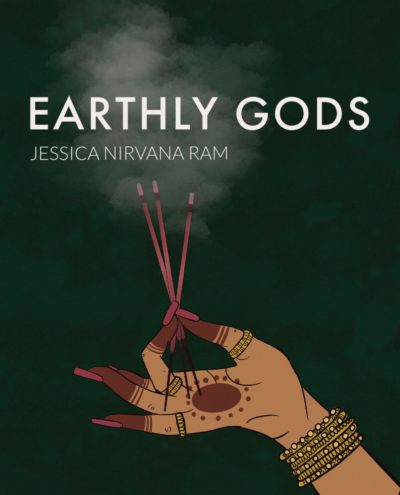I Believed More in My Grandmother than God: On Jessica Nirvana Ram’s Earthly Gods

Earthly Gods
Jessica Nirvana Ram
Game Over Books, 2025
In the titular poem of Jessica Nirvana Ram’s debut collection, Earthly Gods, the speaker asserts, “my belief in god comes from/my grandmother” and “she/ was my first religion.” Right away, these lines help me understand this speaker intimately–who she is devoted to, where her reverence lies, how she is shaped by the women in her life. She also writes, “parents/ are our earthly gods,” declaring her devotion toward these figures rather than intangible or conceptual idols. There is, in these poems, a strong sense of adoration and gratitude for the women–mainly, her grandmother–who raised the speaker that makes this book feel like a long epistolary dedicated to this particular subject.
The first poem of the collection, “88-01 88th Street,” an ode to the speaker’s grandmother, ends with the lines,
“her hands were my hands as I taught myself
to pray again, in the quiet of my apartment.”
Not only does her grandmother teach the speaker to pray, she becomes a symbol for prayer itself. The speaker meditates on her relationship with faith and religion, and how she carries forward the practice of prayer she received from her grandmother. How much of this practice does the adult speaker retain? Besides prayer, what else does the speaker inherit?
The collection opens with an epigraph from Aja Monet:
“we exist between
a self for self and a self for others”
This epigraph not only primes the reader to enter the book with a sense of curiosity about the idea of the self, it also pushes us to interrogate the relationship(s) between self and identity. Ram interrogates the multiplicity of the self through different threads in her collection, primarily her matrilineage, and the baggage that comes with embracing one’s history. How does one derive a self that is a culmination of so many other selves? When tracing one’s matrilineage, how does one differentiate where one woman’s identity ends and another’s begins?
The collection variously explores the concept of the self as a vessel that carries forward rituals, memories, wounds, and as a tool that facilitates one’s own social construction. In her blurb for Earthly Gods, Meg Day, author of Last Psalm at Sea Level, writes of this collection as one engaged in “divining one’s own mythology.” The speaker divines her unique mythology in fragmented, but ultimately formative, parts: via poems of girlhood, in questioning her diasporic identity, interrogating maternal ancestries and her relationship to god, among others. This complex process of self-architecture moves the collection forward, as the speaker attempts to construct a self that is separate from, but not exclusive of, her maternal identities.
While building this new self, the speaker simultaneously builds a relationship with god, often drawing from what she was taught, while making room for her own practices. As she wrestles with handed-down belief systems while constructing a self-mythology, she begins to articulate what the word “holy” means to her. In “Notes on Searching,” a poem that appears in the first section of the book, she writes:
“I take a finger & carve an outline
of an Om into the sudsy canvas
of my stomach.
I don’t think I knew god yet,
but this is what holy looked like,
something I could memorize,
form with my own hands.”
I find it particularly interesting that the speaker’s fundamental understanding of holiness is so deeply intertwined with her knowledge of inhabiting a tangible body. In recognizing holiness as an embodied feeling, she is able to define her devotion. In the second half of the book, the poem “How to Discard Offerings” appears, where she ends with the lines:
“I want to believe the definition of holy
can be of my own design.”
Poetry is, then, another way the speaker practices prayer. Instead of surrendering to a deity, here we find her surrendering to the omniscience of language that surrounds her. Through sharp diction and a tenderness that guides her relationship to poetry, the speaker devises her own methods of prayer. In “Ars Poetica,” she writes:
“Poem ribbons around me,
snakelike but still measured.
Poem has hasty palms, like they want
to own me. I let poem own me.”
In parallel with prayer, she embarks on this journey of becoming–mirroring the traditional arc of the hero’s journey–that ultimately concludes in higher self filled with self-love, acceptance, and a realization that a woman is, indeed, a collection of her histories. We come to learn more and more about the speaker as she moves the reader along these various and intersecting tenets of her developing self. One of these tenets is daughterhood and what might constitute a sense of self for a diasporic daughter whose ancestors lived in multiple places. Focusing on her Guyanese identity and what it means to belong to different cultures, living in a state of constant in-betweenness, having not one but multiple selves, Ram writes in “Contract for Assimilation,”: “Ma, I am foreign in every space I inhabit.” Here, the grief of feeling like someone placed outside the scene is mixed with a sincere appeal to assimilate–to find community where one feels welcome, not shunned. This theme also raises important questions about homogeneity in diasporic culture: how does one preserve their heritage while learning the ways of a new world? And in doing so, how does one resist the risk of being isolated from one’s community?
Earthly Gods excavates the various coordinates that constitute the self. However, it doesn’t portray the speaker as missing parts of her identity, instead makes an argument that, through these fragments, the speaker is not just whole, but contains a reservoir greater than the sum of individual parts. In “river woman,” she declares, “love, I am nothing but excess.”
